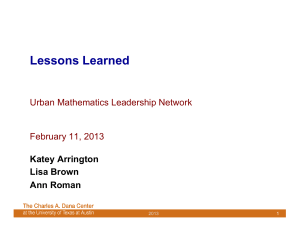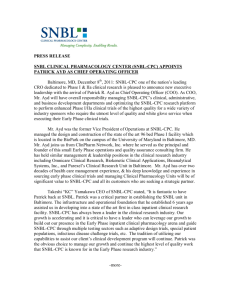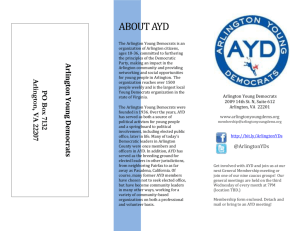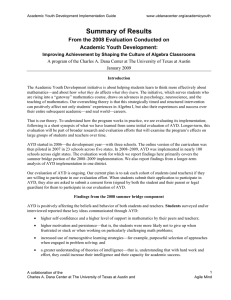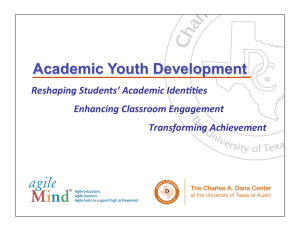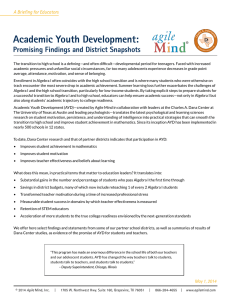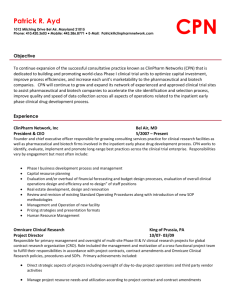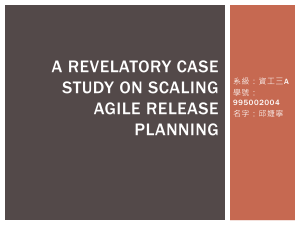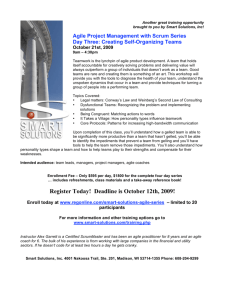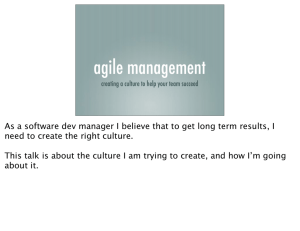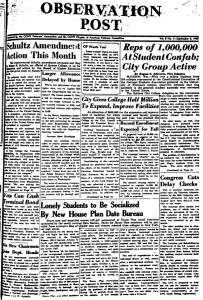AYD Academic Youth Development Reshape
advertisement
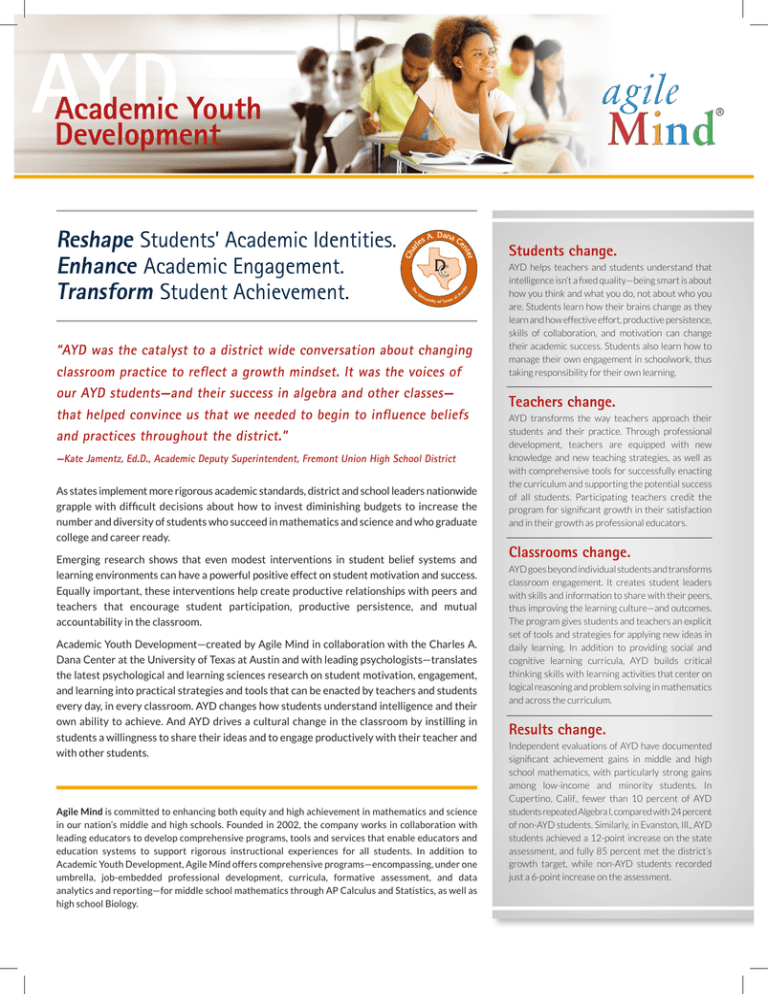
AYD Academic Youth Development Reshape Students’ Academic Identities. Enhance Academic Engagement. Transform Student Achievement. “AYD was the catalyst to a district wide conversation about changing classroom practice to reflect a growth mindset. It was the voices of our AYD students—and their success in algebra and other classes— that helped convince us that we needed to begin to influence beliefs and practices throughout the district.” —Kate Jamentz, Ed.D., Academic Deputy Superintendent, Fremont Union High School District As states implement more rigorous academic standards, district and school leaders nationwide grapple with difficult decisions about how to invest diminishing budgets to increase the number and diversity of students who succeed in mathematics and science and who graduate college and career ready. Emerging research shows that even modest interventions in student belief systems and learning environments can have a powerful positive effect on student motivation and success. Equally important, these interventions help create productive relationships with peers and teachers that encourage student participation, productive persistence, and mutual accountability in the classroom. Academic Youth Development—created by Agile Mind in collaboration with the Charles A. Dana Center at the University of Texas at Austin and with leading psychologists—translates the latest psychological and learning sciences research on student motivation, engagement, and learning into practical strategies and tools that can be enacted by teachers and students every day, in every classroom. AYD changes how students understand intelligence and their own ability to achieve. And AYD drives a cultural change in the classroom by instilling in students a willingness to share their ideas and to engage productively with their teacher and with other students. Agile Mind is committed to enhancing both equity and high achievement in mathematics and science in our nation’s middle and high schools. Founded in 2002, the company works in collaboration with leading educators to develop comprehensive programs, tools and services that enable educators and education systems to support rigorous instructional experiences for all students. In addition to Academic Youth Development, Agile Mind offers comprehensive programs—encompassing, under one umbrella, job-embedded professional development, curricula, formative assessment, and data analytics and reporting—for middle school mathematics through AP Calculus and Statistics, as well as high school Biology. Students change. AYD helps teachers and students understand that intelligence isn’t a fixed quality—being smart is about how you think and what you do, not about who you are. Students learn how their brains change as they learn and how effective effort, productive persistence, skills of collaboration, and motivation can change their academic success. Students also learn how to manage their own engagement in schoolwork, thus taking responsibility for their own learning. Teachers change. AYD transforms the way teachers approach their students and their practice. Through professional development, teachers are equipped with new knowledge and new teaching strategies, as well as with comprehensive tools for successfully enacting the curriculum and supporting the potential success of all students. Participating teachers credit the program for significant growth in their satisfaction and in their growth as professional educators. Classrooms change. AYD goes beyond individual students and transforms classroom engagement. It creates student leaders with skills and information to share with their peers, thus improving the learning culture—and outcomes. The program gives students and teachers an explicit set of tools and strategies for applying new ideas in daily learning. In addition to providing social and cognitive learning curricula, AYD builds critical thinking skills with learning activities that center on logical reasoning and problem solving in mathematics and across the curriculum. Results change. Independent evaluations of AYD have documented significant achievement gains in middle and high school mathematics, with particularly strong gains among low-income and minority students. In Cupertino, Calif., fewer than 10 percent of AYD students repeated Algebra I, compared with 24 percent of non-AYD students. Similarly, in Evanston, Ill., AYD students achieved a 12-point increase on the state assessment, and fully 85 percent met the district’s growth target, while non-AYD students recorded just a 6-point increase on the assessment. The AYD Family of Programs for Educators and Their Students The programs in Agile Mind’s AYD family share common foundations in the latest research on student motivation, engagement, and learning, and each program is designed to increase the number and diversity of students who succeed in STEM courses and in high school. The AYD programs stimulate interest in learning through interactive animations of key concepts, rich instructional materials, and problem-solving scenarios that create novel opportunities to apply new learning. With these common foundations and outcomes, the resources, structures, and design of each program is tailored to meet the specific needs of its intended audience. Summer-Start AYD School-Year AYD Educator’s Course in AYD Summer-Start AYD, for students and teachers who are preparing for Algebra I in the fall, prepares students to excel in high school, constructing a positive learning environment for themselves and their peers. Beginning in a relaxed rather than high-stakes setting, Summer-Start AYD introduces key ideas and strategies from the psychology of learning that students can use to explore and practice problemsolving activities and engage in challenging work known to be associated with success in Algebra and higher-level mathematics. Program activities directly align with the standards for college readiness, and the knowledge and skills students gain in the summer session are reinforced, strengthened, and shared with peers during the academic year. School-Year AYD, for students in grades 8-10 and their teachers, is taught during advisory, homeroom, and after-school programs. With rich facilitative protocols for teachers to use, the curriculum, enriched with interactive simulations and problems, teaches students strategies to manage their learning and to persist in the face of challenging schoolwork. Students are guided through problem-solving activities and small-group discussions that teach them key concepts from the psychology of learning and help them build trust, teamwork, and collective responsibility for learning. As a result, students become more knowledgeable, effective, and reflective about their learning. An Educator’s Course in Academic Youth Development, for faculty teams in schools and districts interested in learning about the powerful emerging research and strategies, includes a 1-day face-to-face seminar focused on what key research reveals about how adults can shape student learning and achievement, and independent study of the research coupled with participation in a facilitated online learning community. [65 curriculum hours for students, 60 hours of blended professional development for teachers] [Educators earn 15 hours of CPE credit through The University of Texas at Austin] [65 curriculum hours for students, 60 hours of blended professional development for teachers] AYD outcomes: Schools can expect: • Significant achievement gains in middle- and high-school mathematics courses, with particularly strong gains among low-income and minority students Students report changes in attitudes, beliefs, and behaviors: • Higher self-confidence and greater feeling of support from peers and teachers • Greater motivation and persistence in the face of frustration with challenges • Increased use of learning strategies that benefit achievement, such as the purposeful selection of approaches to problem solving • Understanding that with effort, they can increase their intelligence and capacity for academic achievement Teachers can expect: • Students taking more responsibility for creating and sustaining positive, productive learning environment • Better student-to-student communications that enable students to talk through ideas and solve problems together • Higher levels of student engagement—especially among those who previously were disengaged in school Agile educators. Agile learners. Agile tools to support high achievement. © 2012 Agile Mind, Inc. | 4101 William D. Tate Ave Suite 220, Grapevine, TX 76051 | 866 284-4655 | www.AgileMind.com
